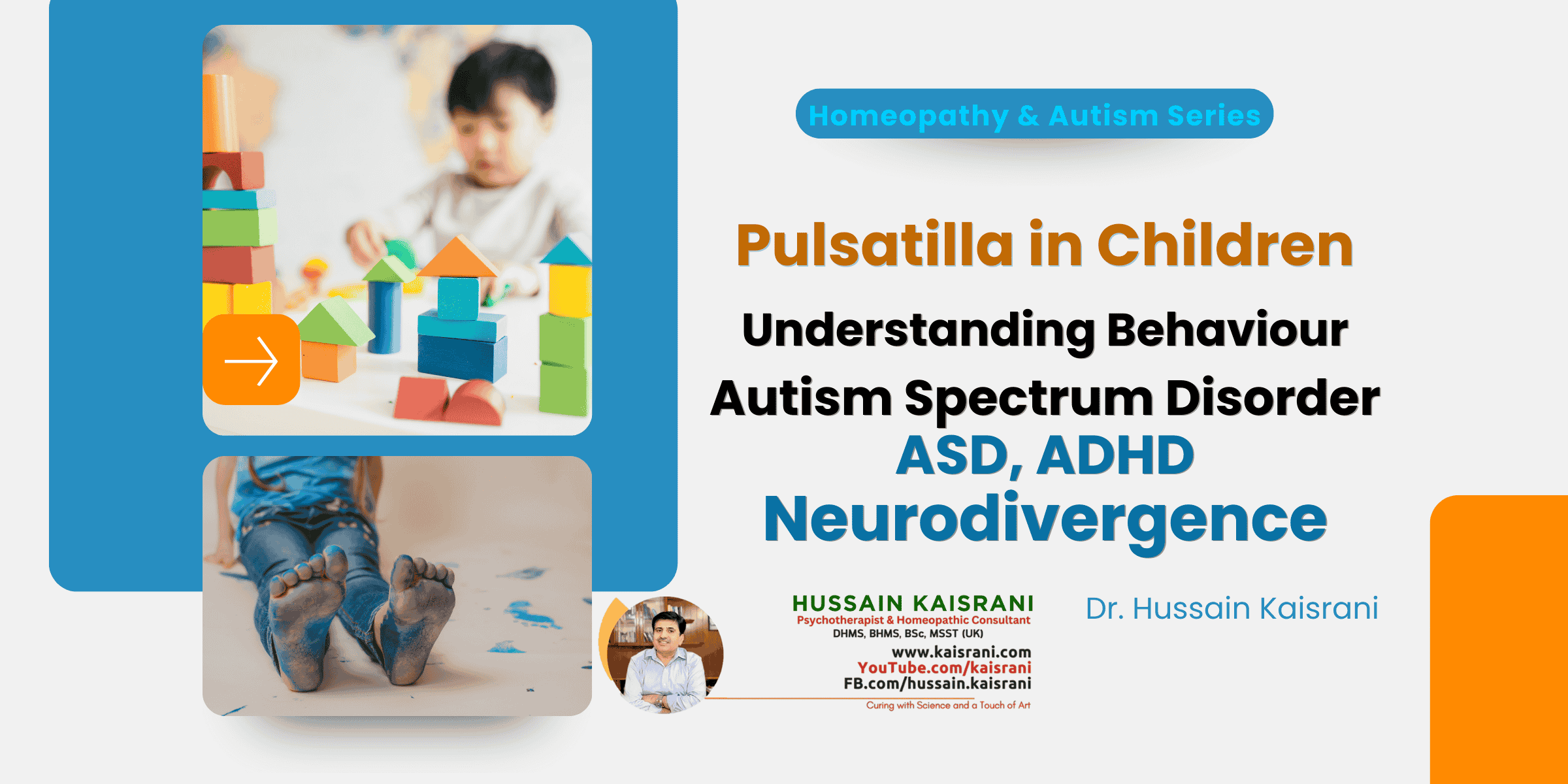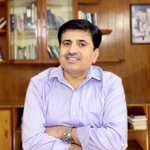Introduction
Homeopathy offers unique insights into the emotional, mental, and physical patterns of children. Among the most frequently used remedies in pediatric and neurodevelopmental care is Pulsatilla. Often prescribed for children with Autism Spectrum Disorder (ASD), ADHD, ODD and other neurodivergent behaviours, Pulsatilla addresses emotional sensitivity, clinginess and heightened dependency on caregivers.
In this series (Homeopathy and Autism Series), Dr. Hussain Kaisrani, a homeopathic physician, explores how to identify the Pulsatilla child, understand their behaviours and support them holistically.
Pulsatilla in Children: Autism, ADHD, Neurodivergent Behaviour & Homeopathic Care | Dr. Hussain Kaisrani
Recognising the Pulsatilla Child
The Pulsatilla child is usually mild, gentle, and soft-spoken, often showing strong attachment to the mother or primary caregiver. Key characteristics include:
- Clinging or dependent behaviour: This does not always mean physically holding on; it refers to an emotional need for constant parental presence.
- Timidity and shyness: Often hesitant to answer questions, may respond in monosyllables or nod rather than speak.
- Emotional sensitivity: Tendency to weep easily or express feelings through crying, especially when ill or distressed.
- Affection-seeking: Strong desire for hugs, caressing and closeness from caregivers.
Behavioural Patterns and Emotional Traits
Pulsatilla children display distinct emotional and mental rubrics:
- Weeping tendencies:
- Children may cry easily, even to the point of vomiting when emotional distress is high.
- They often express their sickness or discomfort through tears.
- Need for affection:
- Desires constant reassurance, cuddling, and being carried when unwell.
- Absorbs affection like a sponge; the more love and care provided, the calmer they become.
- Dependency and clinginess:
- Even adults under Pulsatilla influence may crave maternal or familial comfort.
- They often feel alone or neglected if emotional support is insufficient.
- Manipulativeness and emotional bargaining:
- Pulsatilla children may subtly manipulate to receive love or attention.
- This is not temper tantrum behaviour, but a natural expression of their emotional needs.
- Sensitivity to environment:
- Dislikes harshness, scolding, or abrupt changes.
- Responds positively to gentle handling, open spaces and free movement.
Unique Physical and Mental Symptoms
Pulsatilla children often have:
- Fear and anxiety: Fear of separation from parents, being alone or facing new environments.
- Morning anxiety or care for domestic affairs: Worry about school, studies or household routines.
- Affection-seeking through flattery: May use compliments or praise to obtain love and attention.
- Delusions or feelings of neglect: Feeling of being alone, not belonging or unsupported.
- Health-specific signs: Anxiety during prodromal phases of fever, need for gentle care and preference for mild remedies.
Pulsatilla in Neurodivergent Children (ASD, ADHD, ODD)
In children with Autism Spectrum Disorder or ADHD, Pulsatilla addresses emotional and behavioural challenges by:
- Reducing excessive clinginess or anxiety triggered by separation.
- Encouraging gentle expression of emotions and weeping tendencies.
- Supporting sensitivity to social and environmental stimuli.
- Helping regulate mood, attention and responsiveness to care or affection.
Pulsatilla can also help children navigate social challenges while maintaining their emotional equilibrium.
Practical Homeopathic Guidelines for Parents
- Observe emotional cues: Note crying, clinginess and need for affection.
- Gentle handling: Avoid harsh scolding; offer comfort and reassurance.
- Monitor separation anxiety: Gradually introduce independence while providing support.
- Affection and reassurance: Provide consistent love and attention to reduce emotional distress.
- Use Pulsatilla judiciously: Always consider the totality of symptoms, including mental, emotional and physical rubrics, before prescribing.
Comparison with Phosphorus
While Phosphorus also shows affectionate tendencies:
- Phosphorus children usually return affection.
- Pulsatilla children often desire affection primarily for themselves, sometimes displaying emotional “blackmail” to obtain love.
Understanding this distinction helps differentiate between remedies in complex cases.
Additional Observations
- Gender-specific traits: Pulsatilla may show effeminate behaviour in males or strong dependency in females.
- Fear responses: Fear of darkness, being alone or separation from caregivers.
- Submissiveness: Often highly yielding and family-focused.
- Love for pets and home: Strong attachment to home environment and familiar beings.
Conclusion
Pulsatilla is a key homeopathic remedy for children exhibiting emotional sensitivity, dependency, weeping tendencies, or neurodivergent behaviours such as ASD, ADHD or ODD. Recognising these patterns allows for targeted and compassionate care.
By understanding the child’s emotional needs, parents can create a supportive environment that enhances emotional, social and developmental growth.
About the Author: Dr. Hussain Kaisrani
Dr. Hussain Kaisrani (BHMS, MD Homeopathy) is an internationally recognised homeopathic physician with over 20 years of experience in pediatric and neurodevelopmental care. He specialises in Autism Spectrum Disorder, ADHD, ODD, and other neurodivergent conditions, integrating homeopathy with modern clinical understanding to improve emotional, cognitive and behavioural outcomes.
Dr. Kaisrani is also a prolific educator, author and speaker on homeopathy and child health. This article is a summary of his video presentation Pulsatilla: Homeopathy and Autism Series.
- Website: kaisarani.com
- YouTube Channel: Dr. Hussain Kaisrani
- Social Media: Facebook, Instagram
#Pulsatilla #Homeopathy #ASD #AutismSpectrumDisorder #ADHD #Neurodivergent #PediatricHomeopathy #ChildBehaviour #EmotionalSensitivity #WeepingChild #AffectionSeeking #SeparationAnxiety #hussainkaisrani

